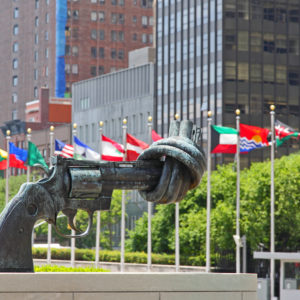Listening to grave pronouncements of U.N. officials these last few weeks, things certainly don’t sound pretty. Proposed budget cuts to the organization would make operations “impossible,” and planned U.S. withdrawal from the Paris Agreement spells a death knell for Mother Earth. But this alarmism is just a diversion away from the very real problems plaguing the United Nations. And by providing $8 billion a year to the organization, U.S. taxpayers are forced to enable the United Nations’ epic dysfunction and incompetence.
Some of the organization’s problems are run-of-the-mill bureaucratic malaise. Like any government body, there’s little incentive for the United Nations to find the most cost-efficient solution. Few were surprised in 2015, for instance, when the Government Accountability Office released a report detailing the United Nations’ extensive cost and schedule overruns in renovating its headquarters in New York City. Bureaucrats barely blinked an eye, despite a three-year delay and $380 million in unanticipated costs. Other shenanigans, however, fall below taxpayers’ already-low standards for the United Nations.
Last month, for example, the Associated Press reported that World Health Organization Director-General Margaret Chan splurged on hotel accommodations during a trip to Guinea. After honoring the achievements of poorly paid WHO workers in combating the Ebola virus, Dr. Chan retired to the luxurious, top-tier presidential suite at the oceanside Palm Camayenne Hotel. Thousands of dollars were put on the organization’s credit card, and U.S. taxpayers by extension were bilked for the luxury getaway.
But this outrageous bill was only the tip of the iceberg; WHO-wide travel expenses in 2016 tallied more than $200 million for the 7,000 staff employees. By way of comparison, this figure exceeds the combined total that the WHO spent on fighting AIDS and hepatitis ($70.5 million), malaria ($61 million), and tuberculosis ($59 million) during that year.
But the United Nations’ outrageous behavior doesn’t stop at its exorbitant travel outlays. Press members regularly have their credentials wantonly revoked at “public” U.N. meetings, and are forcibly expelled. Last year, for example, journalist Drew Johnson was forcibly removed from a tobacco control meeting in India for violating the continued ban on press presence.
It’s little wonder that the United Nations is camera shy, given how frequently it skirts the rule of law. A quick look at its contracting policies shows just how shady the “transparent” organization really is. When the United States barred agencies from contracting out work to companies dabbling in illegal activities, the United Nations simply looked the other way and continued financial relationships with these corporations.
Agility DGS, which was barred from doing business with the federal government after overcharging the military by $350 million, received a $165-million contract from the United Nations through its subsidiary in 2013. Just six months ago, yet another Agility subsidiary won a $101,600 contract to deliver pre-built residential buildings to the Congo.
To bureaucrats under the tutelage of Secretary-General Antonio Guterres, recruiting crooked companies to build and ship homes at inflated rates makes more sense than relying on the (far cheaper) services of Congolese workers.
By continuing to patronize corrupt mega-corporations, the United Nations has enabled the ultimate end-around U.S. laws and made U.S. taxpayers dabble in dubious dealings.
While a GAO investigation would certainly be welcome, even a harshly worded indictment is unlikely to deter the motley crew at the United Nations. These “experts” in international governance are determined to advance their pet projects regardless of cost or ethicality. The Paris Agreement, wisely jettisoned by the United States, is just the latest expensive, harebrained initiative to come out of the United Nations.
As per usual, U.S. citizens were asked to foot the overwhelming percentage of implementation costs, while China and India were largely spared. American taxpayers were to cough up $3 billion for the so-called “Green Climate Fund,” which would dole out money for renewable projects in developing countries. But as debacles like the infamous Kerala solar scam in India and idle solar plants in China show, third-world governments are especially prone to haphazard energy boondoggles. Had the United States stayed in the agreement, American taxpayers would have been on the line for Solyndras and SunEdisons across the globe.
The United Nations aspires to the lofty goals of peace, harmony and cooperation. But as long as shady dealings and graft tarnish the organization’s image, the United Nations’ credibility will remain in tatters.
As presently construed, the United Nations does not deserve the support of the United States and its overburdened taxpayers. By defunding the cabal of corrupt and ineffective officials, the United States can shield taxpayers from “bougie” trips to Ghana and Enron doppelgangers.

